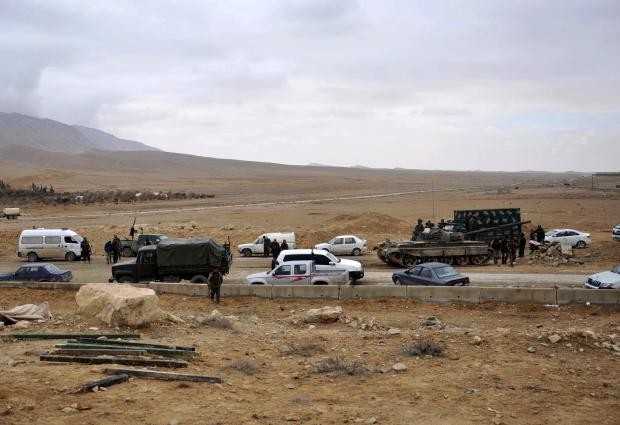Syrian army retakes town of Palmyra as IS defenses crumble

In this photo released by the Syrian official news agency SANA, Syrian forces take up positions during fighting between Government forces and Islamic State group militants in the ancient city of Palmyra, near Homs, Syria, Thursday, March 2, 2017. Syrian state media says government forces have reached the edge of Palmyra and are poised to reclaim the historic town from the Islamic State group. (Photo from SANA via AP)
BEIRUT — Syrian government forces recaptured Palmyra from the Islamic State group on Thursday, scoring a victory against the militants who had seized the historic town in December for the second time, a Syrian military statement said.
The military said troops gained full control of the desert town in central Syria following a series of military operations carried out with the help of Russian air cover and in cooperation with “allied and friendly troops” – shorthand for the Lebanese militant Hezbollah group. Hezbollah is fighting alongside Syrian President Bashar Assad’s forces in the civil war.
IS defenses around the town had begun to erode on Sunday, with the government troops reaching Palmyra’s outskirts on Tuesday. The SANA news agency reported earlier that government troops had entered the town’s archaeological complex, a UNESCO World Heritage Site, around mid-day, then the town itself, as IS militants fled the area.
This is the government’s second campaign to retake the desert town. It seized Palmyra from Islamic State militants last March only to lose it again 10 months later.
Before the civil war gripped Syria in 2011, Palmyra was a top tourist attraction, drawing tens of thousands of visitors each year.
Article continues after this advertisementThe Kremlin’s spokesman, Dmitry Peskov, had said earlier that Russian President Vladimir Putin was informed by his defense minister that Syrian troops had gained control of Palmyra, with support from Russian warplanes.
Article continues after this advertisementThe Syrian government’s push has relied on ground support from Lebanon’s militant Hezbollah group and Russian air cover, according to Hezbollah’s media outlets.
The town, according to Mohammed Homsi, the director of the activist-run Palmyra News Network, is almost entirely deserted. Islamic State fighters reportedly evacuated the last of their relatives on Sunday, he said.
Archeologists have decried what they say is extensive damage to its priceless ruins.
Drone footage released by Russia’s Defense Ministry earlier this month showed new damage to the facade of Palmyra’s Roman-era theater and the adjoining Tetrapylon – a set of four monuments with four columns each at the center of the colonnaded road leading to the theater.
A 2014 report by a UN research agency disclosed satellite evidence of looting while the ruins were under Syrian military control. Opposition factions have also admitted to looting the antiquities for funds.
The IS group has twice used the town’s Roman theater as a stage for mass killings, most recently in January, when they shot and beheaded a number of captives they said had tried to escape their December advance. Other IS killings were said to have taken place in the courtyard of the Palmyra museum and in a former Russian base in the town.
The developments in Palmyra came against the backdrop of Syrian peace talks underway in Geneva, which have been without any tangible breakthroughs so far. Diplomats and negotiators have set their sights on modest achievements in the latest round of talks, after a week of discussions centering on setting an agenda for future talks.
On Thursday, UN Special Envoy to Syria Staffan de Mistura was due for another round of meetings with both the government delegation and opposition groups.
Russian Deputy Foreign Minister Gennady Gatilov told reporters Wednesday that “the parties have agreed to … discuss all issues in a parallel way, on several tracks.”
After a Damascus request, the issue of terrorism is also on the table, he had said. Russia is a key sponsor of Syrian President Bashar Assad’s government in Damascus.
A top Syrian opposition negotiator, Nasr al-Hariri, said the talks would likely culminate in a closing ceremony on Friday and the parties may be back in Geneva for further discussions in a few weeks.
Setting the agenda and strategy to guide discussions has proven difficult as the main conflicting parties dig in their heels over form and semantics.
In Turkey, the country’s foreign minister said that with the completion of an operation to retake the IS-held town of al-Bab in northern Syria, Turkish troops will head to the Syrian town of Manbij next, to oust US-backed Syrian Kurdish forces that Ankara views as terrorists and a threat to Turkey.
Foreign Minister Mevlut Cavusoglu said Thursday that Turkey would not shy away from attacking the Kurdish group that dominates the Syria Democratic Forces, which captured Manbij last year after weeks of deadly fighting with IS.
He renewed calls for the new US administration not to support the Kurdish forces. Cavusoglu stressed that an operation to take Manbij had not started yet, but acknowledged that skirmishes between Turkish-backed forces and the Kurdish fighters may have occurred.
That front line in northern Syria was further complicated by a concurrent announcement by the Syrian Kurdish side on Thursday that they had agreed with Russia to withdraw from some of the territory between al-Bab and Manbij, to make room for a buffer.
The Manbij Military Council, part of the Kurdish-led Syrian Democratic Forces, said that under the deal, they will withdraw from a front line as the rival Turkish-backed forces near the Euphrates River. This will allow Syrian government forces to create a buffer between them.
However, Cavusoglu denied any such agreement was reached.
There was no immediate comment from the Syrian government. The Turkish and Syrian authorities have long regarded each other with thinly-veiled hostility. –Philip Issa
* * *
Associated Press writers Dominique Soguel in Geneva, Kirsten Grieshaber in Berlin, and Albert Aji in Damascus, Syria, contributed to this report.